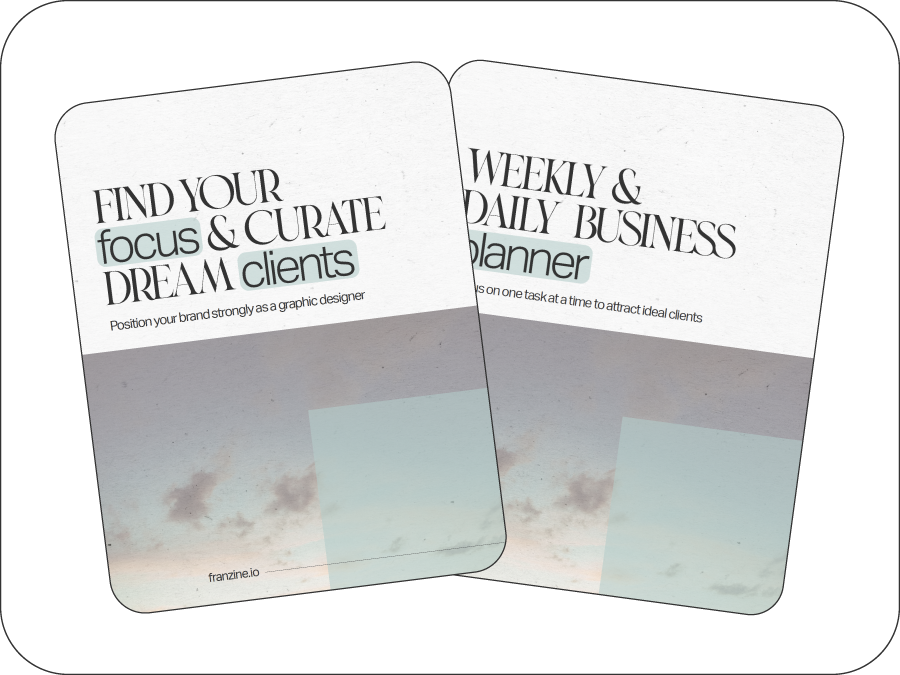Uplevel Skills as a Graphic Designer with Habits

Are you reading this as you’re thinking about how to revamp your business? There’s so much anxiety (and pressure) at the start of every season. Whether that’s a new business, new year, or new quarter, there is so much to consider when trying to grow. How can you possibly upskill as a freelancer or creative business owner with so much to do?
People worry about market saturation, automation, machines and other tech replacing creative jobs. Or platforms that are treating our skills like commodities and lowering value.
You’re probably thinking of 99 Designs, Fivver, Canva, Design Pickle, or any other software that has templates for non-designers to use. These are things that pose a threat by providing means to take advantage of free or dirt cheap work. You may believe these to be direct competitors or just a threat to the creative industry as a whole.
It’s especially difficult not to look at those things with disgust if you’re not currently meeting your income goals or getting better clients.
However, I’m here with some good news and motivation.
What they can’t replace are the human mind and critical thinking.
Remember that in order to upskill, designs need a foundation.
The most successful companies out there with beautiful visuals and relevant messaging have gone through careful meetings, brainstorming, discussions, organization, and planning.
The businesses that are seeing success but lack a visual identity that matches their vision will eventually bring on bright minds to improve and oversee that kind of work.
Bear in mind that we have choices for our actions.
If you’re feeling down, it’s okay. Give your feelings and concerns some space. Embrace it for what it is, and then see what can be done from there. If you dwell in a negative space without action, it will severely affect your performance.
Next, upskill by prioritizing learning in a ritualistic manner.
Read, learn, watch, but give yourself a few rules.
Want to know how I read many books this year, finished the courses that I bought, and took action?
1. Reflect on how this is relevant to your life
Intention, intention, intention!
Find the intention of every action. In order to maximize the time we do have, it’s always beneficial to find a purpose for it. But make sure it’s not just something small like “it would be nice to…”. Many books, technology, skills, etc have SOME sort of benefit. That can’t be our reasoning though.
It has to have many benefits that align to your values and goals. You have to be picky about this. And only you would know your personality when it comes to saying yes, signing up to something, or making purchases.
When you organize and plan beforehand, you’re taking away unnecessary brain power or energy you may need that day. Your mind is at ease, and you will be better at what you do.
2. Schedule a time to go over the material
If you want to be serious about getting something done, how will that happen if you don’t make it official? I highly recommend keeping track of what you need to do during the day so you can map out plans easier. I prefer a physical planner along with a project management software that integrates with my Google Calendar. But even just a calendar will work!
3. Estimate how long it will take you to upskill
Most of us think we don’t have time, but usually, there’s space to do it. Have you ever audited your day? How much time is spent on distracting websites or social media? Have you ever checked the “Screen Time” section on your iPhone? What about TV, etc? Most cases, people can find an hour of time to free up.
If you think you will lag, try “binging” it in a week. For example, if I need to finish taking a course, I know I have to set up time to do it on a Saturday and Sunday. I usually don’t work on weekends but if it’s not very often (and in this case, it’s not) and I know it will be beneficial on many levels, I’ll do it. You can also schedule 30-60 minutes a day until you’re done with a task. For a book, you can make milestone goals like at least 2 chapters a day.
4. Summarize it – know it well!
Because reading or listening without retention is wasted time.
Make sure after each lesson or chapter, you can write down what you learned. If not, go over it again while it’s still fresh in your mind.
Sometimes it’s easier to feel productive because you’ve simply consumed information (guilty!). It seems that way because though our brains are working hard to process what we learned, taking action is the only way to make sure it sticks.
Easy ways to do this: write it down after each day to see how much of it you know, or teach it to someone else. If there are actionable steps, maybe do a practice run (this is especially relevant if you’re learning a new design skill like mastering the pen tool on Illustrator).
5. Make it a priority to take action steps
Do not procrastinate when it comes to applying your new-found knowledge! Integrate it with your life, habits, or activities.
Keep asking yourself the right questions. What part of the content you learned will be valuable if you make a point to add it to your routine?
You’ll really have to decide how to upskill as a ritual. It’s not always easy to weave it in with everything else, so something it’s good to map out your day. How will this enhance your career when you’ve successfully done this?
Habits or working knowledge of something will take time to master. Be patient when it comes to the process. It could take 3 weeks or several months. How much are you willing to commit?
6. Keep in mind how you will reward yourself or rest after
At this step, you’ve seen the fruits of labor. Make sure there is a clear cut incentive for you at the end.
- Maybe you’ll take an extra day off and have a long weekend?
- Maybe you’ll go out and get something fancy?
- Maybe you’ll go on a nice trip?
Rest is an integral part in the upskill process. You want to respect the balance in your life. One thing that will keep you from progressing is burnout!
At the end of all of this, know your limits and be kind to yourself. You’re committed to knowledge and high-quality work and you should be proud of your intentions!
Get the 3-day email guide to writing something that feels more like you and less like you're applying to a job so you can build your personal brand

